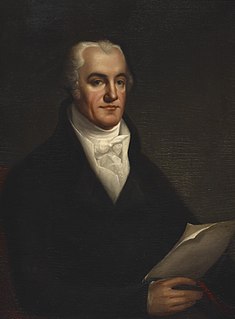A Quote by Joel Barlow
A habitual disuse of physical forces totally destroys the moral; and men lose at once the power of protecting themselves, and of discerning the cause of their oppression.
Related Quotes
The men who are to protect the community against violent aggression easily turn into the most dangerous aggressors. They transgress their mandate. They misuse their power for the oppression of those whom they were expected to defend against oppression. The main political problem is how to prevent the police power from becoming tyrannical. This is the meaning of all the struggles for liberty.
Around the world, we see the results of exploitation which destroys much without taking future generations into account. Protecting the world's forests; stemming desertification and erosion; avoiding the spread of toxic substances harmful to man, animals and plants; protecting the atmosphere; all these can be accomplished only through active and wise cooperation, without borders or political power plays.
Nearly everybody nowadays accepts the 'causal completeness of physics' - every physical event (or at least its probability) has a full physical cause. This leaves no room for non-physical things to make a causal difference to physical effects. But it would be absurd to deny that thoughts and feelings (and population movements and economic depressions . . .) cause physical effects. So they must be physical things.
The anti-imperialist, forces in the country [Zimbabwe] here, I think are not that strong. The capitalist forces, the reactionary forces are far more formidable, far better organised. But we would have wanted to hear the voice of the anti-imperialist forces, those who espouse the cause of freedom, the cause of independence, everywhere.
To try to reform all the power structures at once would leave us with no power structure to use in our project. In any case, we will be able to see that absolute moral renewal could be attempted only by an absolute power and that a tyrannous force such as this must destroy the whole moral life of man, not renew it.
A materialist feminist approach to women's oppression destroys the idea that women are a 'natural group' . . . What the analysis accomplishes on the level of ideas, practice makes actual at the level of facts: by its very existence, lesbian society destroys the artificial (social) fact constituting women as a 'natural group.' A lesbian society pragmatically reveals that the division from men of which women have been the object is a political one . . .
Thus, experience has ever shown, that education, as well as religion, aristocracy, as well as democracy and monarchy, are, singly, totally inadequate to the business of restraining the passions of men, of preserving a steady government, and protecting the lives, liberties, and properties of the people . . . . Religion, superstition, oaths, education, laws, all give way before passions, interest, and power, which can be resisted only by passions, interest, and power.
Successful or not, acts of physical courage always bring honor. It is the smaller forms of valor - standing up for principle at the risk of social disapproval, economic loss or injury to career - that require the greatest moral will power. Since there is usually little upside to winning and a significant and often lasting downside to losing, moral courage often requires as much character as physical bravery.
Once you buy the argument that some segment of the citizenry should lose their rights, just because they are envied or resented, you are putting your own rights in jeopardy - quite aside from undermining any moral basis for respecting anybody's rights. You are opening the floodgates to arbitrary power. And once you open the floodgates, you can't tell the water where to go.






































